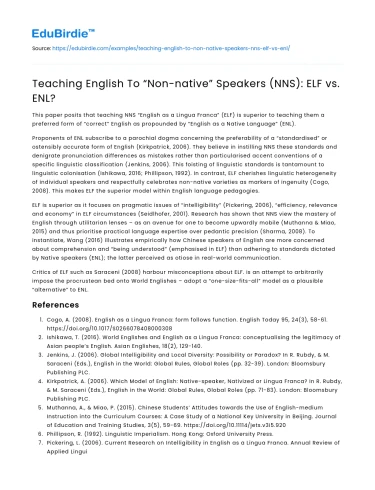This paper posits that teaching NNS “English as a Lingua Franca” (ELF) is superior to teaching them a preferred form of “correct” English as propounded by “English as a Native Language” (ENL).
Proponents of ENL subscribe to a parochial dogma concerning the preferability of a “standardised” or ostensibly accurate form of English (Kirkpatrick, 2006). They believe in instilling NNS these standards and denigrate pronunciation differences as mistakes rather than particularised accent conventions of a specific linguistic classification (Jenkins, 2006). This foisting of linguistic standards is tantamount to linguistic colonisation (Ishikawa, 2016; Phillipson, 1992). In contrast, ELF cherishes linguistic heterogeneity of individual speakers and respectfully celebrates non-native varieties as markers of ingenuity (Cogo, 2008). This makes ELF the superior model within English language pedagogies.
Save your time!
We can take care of your essay
- Proper editing and formatting
- Free revision, title page, and bibliography
- Flexible prices and money-back guarantee
ELF is superior as it focuses on pragmatic issues of “intelligibility” (Pickering, 2006), “efficiency, relevance and economy” in ELF circumstances (Seidlhofer, 2001). Research has shown that NNS view the mastery of English through utilitarian lenses – as an avenue for one to become upwardly mobile (Muthanna & Miao, 2015) and thus prioritise practical language expertise over pedantic precision (Sharma, 2008). To instantiate, Wang (2016) illustrates empirically how Chinese speakers of English are more concerned about comprehension and “being understood” (emphasised in ELF) than adhering to standards dictated by Native speakers (ENL); the latter perceived as otiose in real-world communication.
Critics of ELF such as Saraceni (2008) harbour misconceptions about ELF. is an attempt to arbitrarily impose the procrustean bed onto World Englishes – adopt a “one-size-fits-all” model as a plausible “alternative” to ENL.
References
- Cogo, A. (2008). English as a Lingua Franca: form follows function. English Today 95, 24(3), 58-61. https://doi.org/10.1017/S0266078408000308
- Ishikawa, T. (2016). World Englishes and English as a Lingua Franca: conceptualising the legitimacy of Asian people’s English. Asian Englishes, 18(2), 129-140.
- Jenkins, J. (2006). Global Intelligibility and Local Diversity: Possibility or Paradox? In R. Rubdy, & M. Saraceni (Eds.), English in the World: Global Rules, Global Roles (pp. 32-39). London: Bloomsbury Publishing PLC.
- Kirkpatrick, A. (2006). Which Model of English: Native-speaker, Nativized or Lingua Franca? In R. Rubdy, & M. Saraceni (Eds.), English in the World: Global Rules, Global Roles (pp. 71-83). London: Bloomsbury Publishing PLC.
- Muthanna, A., & Miao, P. (2015). Chinese Students’ Attitudes towards the Use of English-medium Instruction into the Curriculum Courses: A Case Study of a National Key University in Beijing. Journal of Education and Training Studies, 3(5), 59-69. https://doi.org/10.11114/jets.v3i5.920
- Phillipson, R. (1992). Linguistic Imperialism. Hong Kong: Oxford University Press.
- Pickering, L. (2006). Current Research on Intelligibility in English as a Lingua Franca. Annual Review of Applied Linguistics, 26, 219-233.
- Sharma, B. K. (2008). World Englishes, English as a Lingua Franca, and English Pedagogy. Journal of NELTA, 13(1-2), 121-130.
- Siedlhofer, B. (2001). Closing a conceptual gap: the case for a description of English as a lingua franca. International Journal of Applied Linguistics, 11(2), 133-158.
- Wang, Y. (2016). Native English speakers’ authority in English. English Today 125, 32(1), 35-40. https://doi.org/10.1017/S0266078415000516
Did you like this example?
Make sure you submit a unique essay
Our writers will provide you with an essay sample written from scratch: any topic, any deadline, any instructions.
Cite this paper
-
APA
-
MLA
-
Harvard
-
Vancouver
Teaching English To “Non-native” Speakers (NNS): ELF vs. ENL?
(2022, February 21). Edubirdie. Retrieved December 22, 2024, from https://edubirdie.com/examples/teaching-english-to-non-native-speakers-nns-elf-vs-enl/
“Teaching English To “Non-native” Speakers (NNS): ELF vs. ENL?” Edubirdie, 21 Feb. 2022, edubirdie.com/examples/teaching-english-to-non-native-speakers-nns-elf-vs-enl/
Teaching English To “Non-native” Speakers (NNS): ELF vs. ENL? [online].
Available at: <https://edubirdie.com/examples/teaching-english-to-non-native-speakers-nns-elf-vs-enl/> [Accessed 22 Dec. 2024].
Teaching English To “Non-native” Speakers (NNS): ELF vs. ENL? [Internet] Edubirdie.
2022 Feb 21 [cited 2024 Dec 22].
Available from: https://edubirdie.com/examples/teaching-english-to-non-native-speakers-nns-elf-vs-enl/
copy






 Stuck on your essay?
Stuck on your essay?

